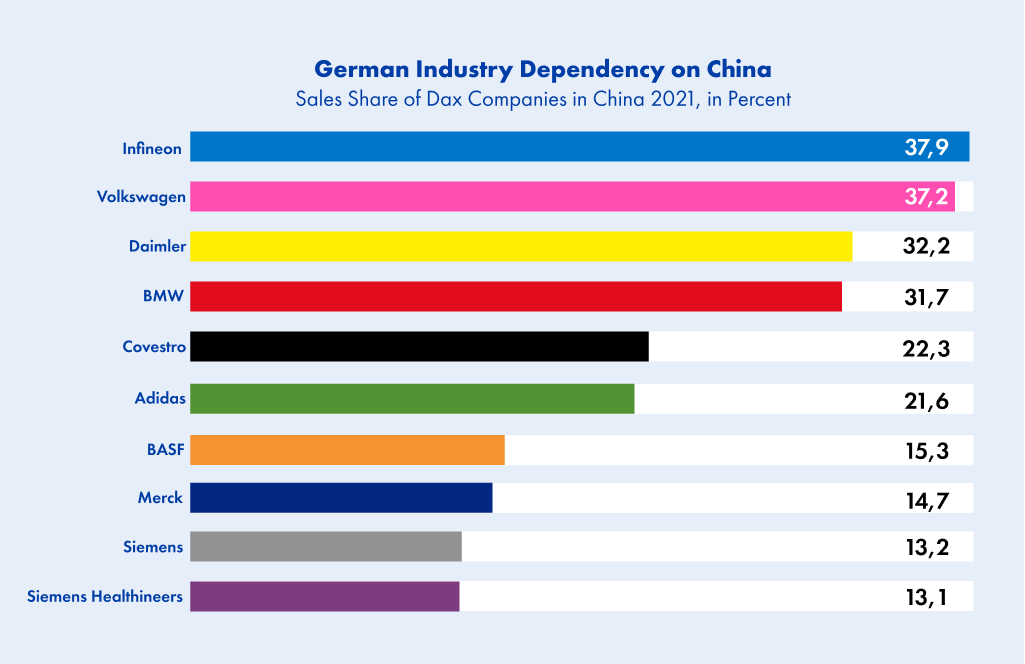Issue #104
Issue #104
Guten Morgen!
Welcome to another edition of the Krautshell! Fear not, the Krautshell team is back in force and ready to tackle the week’s events. In our Guest House’s View, Steven E. Sokol tackles Chancellor Scholz’s first trip to China amidst growing tensions and provides some domestic context and strategic outlook. In addition, our main articles discuss the latest escalation of radical climate protests (in Berlin, where else), Italian PM Giorgia Meloni’s attempt to cozy up to Brussels after years of tension, and the power-political dynamic underlying the “Bürgergeld”, the governing coalition’s new welfare proposal. Finally, enjoy Anna’s humorous and slightly depressing take on German bureaucracy and whether she sees things improving in the future (spoiler alert: she doesn’t).
As always, have a great weekend!


Anna Christian
FIRST, SOME SOLID INTEL:
The Radicalization of Climate Protests
Climate protests seemed a lot more radical in Germany lately. After tomato soup in Paris, German protesters threw mashed potatoes at a painting, and more and more often they’re supergluing themselves to streets or who knows what else. If you didn’t know better, you’d think this was an absurd TikTok trend. While climate change deniers now see this as a reason to reject the concerns of the entire climate movement, reasonable people are eager to have a discussion about how much civil disobedience is actually legitimate.
It was particularly tragic in Berlin this week. A female cyclist, who has since sadly passed away, was hit by a truck and seriously injured. The rescue workers who were supposed to help her got caught in a traffic jam and were delayed in making it to the accident scene. This traffic jam, the police now allege, occurred because two protesters from the radical climate movement used superglue to stick themselves to the road a few kilometers away from the accident. The representatives of the movement insistently swear that during their actions there is always room for a rescue lane for emergencies, but that it was simply not formed by the waiting cars. Investigations must now reveal who is right. However, the case clearly shows the situations we are confronted with. A desperate and without question extreme movement is resorting to radical means because they are not allowed to have a say in the important decision-making bodies of politics. But their belief that this legitimizes any extreme form of protest also seems misguided. In any case, however, everyone would do well to take this debate seriously, as it will certainly be with us for some time to come.
Meloni Meets the Brussels Bubble
Dio mio. Judging by the media reaction to Giorgia Meloni’s election victory, you’d think Europe would have come crashing down around our ears by now. But while Italy’s new conservative government has certainly caused its fair share of legitimate concern, early signals are pointing towards a more conciliatory approach towards relations with Brussels than most expected. In fact, Prime Minister Meloni has chosen Brussels for her first foreign trip this week, hoping to calm fears among the European establishment about her (well-earned) nationalist and Eurosceptic credentials. “The trip itself is the message”, as a party official put it.
Few pundits saw this coming, and with good reason. In the run-up to the election, Meloni called for “an Italy that matters more” within the EU (take that, Berlin and Paris). She has also sharply criticized the Commission’s rule-of-law proceedings against Hungary and Poland. The feeling is mutual: Even before the election, Commission President von der Leyen issued an veiled threat, warning that the EU had “tools” should things to in a “difficult direction” (a generous campaign gift, judging by the reaction). Let’s just say that Italian-EU relations have been rosier.
Now Meloni is off to Brussels hoping to smooth the troubled waters, and much depends on finding some common ground. Europe is in the throes of a historic energy crisis, after all, not to mention the brutal war waged on its doorstep. She will likely push both for a united EU response to crippling energy costs, and for more flexibility regarding Italy’s gaping deficit (transl.: expensive campaign promises). Expect some movement on the latter point at least –Italy’s debt mountain is a persuasive argument to wield – while other economic and rule-of-law issues will be harder to crack. At least the partners are aligned on Ukraine, to which Meloni has repeatedly pledged continuing support: Good news for Ukraine and anyone looking for some level of unity in these divided times.
A Prestige Project Stumbles
The modernization of basic benefits for the unemployed is a prestige project of the traffic light coalition. Today we are reporting on it because it is a prime example of how tactics and power relations work in German politics. For the SPD and its Chancellor Olaf Scholz, but also for the coalition partners Greens and FDP, a modernization of the current “Hartz IV” system is long overdue. Now the update, the so-called “citizen’s income”, is to be passed in the Bundestag next week. Such a major law, however, requires the approval of the federal states, which will vote on the law in their own institution, the Bundesrat, after the decision in the Bundestag. The CDU would have liked to stay with the old Hartz IV system, and party and opposition leader Merz is now bringing together all the states with CDU government participation to wring some more compromises out of the governing coalition via the Bundesrat. The CDU governs in 8 of 16 states and thus has the necessary number of votes to block the project.
The new system will substantially increase the standard rates, which currently hardly allow for a decent life in view of rising prices. The CDU criticizes, as it so often does, that this will make working in the low-wage sector hardly worthwhile and that this is unfair to workers with low wages. It will be exciting to see how much blocking the CDU can muster in the Bundesrat. Although they govern in many federal states, they don’t do so alone. In North Rhine-Westphalia, where Minister President Wüst (CDU) is the most prominent opponent of the new system, the Greens are coalition partners and naturally support the project of their colleagues at the federal level. So, the next few weeks will show whether Merz’s plan to use the federal states as an instrument for “weakening” the package will work or even harm the CDU in the end because they will be perceived as blockers.
TAKE A BREAK, GIVE YOUR EYES A REST.

Source: Handelsblatt
THE HOUSE’S VIEW:

Dr. Steven E. Sokol
President and CEO of the American Council on Germany
Commercial Interests vs. Geopolitical Concerns: Is Germany Drawing the Right Lessons from its Dependence on Russia?
As I pull my thoughts together for this month’s (Guest) House View, German Chancellor Olaf Scholz is on his way to Beijing. He will be the first European leader to visit China since Russia’s invasion of Ukraine. Scholz’s trip has sparked some controversy – and comes at an interesting time as Berlin tries to draw lessons from Germany’s dependence on Russian energy and as Europe tries to forge a coherent cohesive policy toward China following the reelection of Xi Jinping for a third term at the Party Conference.
In recent weeks, I have been hearing the quip over and over again that Germany has relied on Russia for cheap energy, on the United States for cheap security, and on China for cheap raw materials and technologies as well as strong export markets for cars and other products MADE IN GERMANY. While there may be some truth to this, as ever the devil is in the details.
Déjà vu all over again?
For months, I have been asking German government officials, Bundestag members, and observers from the media and thinktank communities whether Germany is drawing the necessary lessons from its relatively simple relationship with Russia (centering around an exchange of hard currency for energy) when it comes to Germany’s far more complex relationship with China. Some have told me that Berlin is not yet thinking about China while others have said that there is a change in thinking – and that more and more decision makers in Germany think of China as a partner, a competitor, and a market. There is a great deal of interest in what the position on China will be in Germany’s National Security Strategy and its first China Strategy, both of which are being crafted and are slated for release early next year. It is expected that the China Strategy will underscore the need to diversify German economic interests away from China and toward other Asian partners – underscoring some concerns that China has too much influence over the country’s most powerful companies.
Early in his tenure as Chancellor, Olaf Scholz described Nord Steam 2 as a “commercial project” and did not seem to recognize the geopolitical importance of the pipeline – much like his predecessor Angela Merkel. With Russia’s invasion and the ensuing war in Ukraine, at this point it is unlikely that Nord Stream 2 will ever even go into operation. And, as temperatures drop and energy prices rise, there is recognition (even by some leading SPD politicians like Lars Klingbeil) of some of “mistakes” in Germany’s policy toward Russia
When it comes to relations with China, it seems as though Berlin is once again putting commercial interests first and not taking broader geopolitical interests into consideration.
In late October, it was widely reported that Germany is set to approve the sale by Elmos Semiconductor SE of a plant in Dortmund to China-owned Silex Microsystems. This is happening despite concerns raised by the German intelligence agency and several other government ministries. And just days before his departure to Beijing, Scholz pushed through approval of the sale of a stake in a Hamburg port terminal to COSCO, a Chinese state-owned shipping company, over the objections of his coalition partners, Germany’s intelligence services, six German federal ministries, the European Commission, and Berlin’s allies in Paris and Washington.
These decisions bear an uncanny similarity to Angela Merkel’s decision almost exactly two years ago to push through the EU-China Comprehensive Agreement on Investment at the tail end of Germany’s Presidency of the European Council and just weeks before Joe Biden entered the White House. By focusing on trade and investment, both Merkel and Scholz have given President Xi the ability to extend China’s geopolitical reach. They have not asked for anything in return – and have voluntarily given up any leverage Berlin might have had vis-à-vis Beijing.
Even if the sale of 24.9 percent of one of Hamburg’s four terminals makes good economic sense – and facilitates trade with China – the optics are not good. As one senior German said to me recently: “Doing the right thing at the wrong time still makes it the wrong thing to do.”
German vs. European Interests
It is too early for much of a readout on Scholz’s trip, but it will be interesting to see what is reported in the coming days and weeks – and to see how Berlin (re)defines the contours of Germany’s policy toward China. Berlin has a potential to shape how Europe approaches China given its close economic ties. But if Germany is seen as pursuing its own economic interests with China regardless of its ability to win concessions by applying pressure on China, it is unlikely that other European countries will refrain from making sacrifices of their own.
Scholz’s reluctance to take a tougher line on China may be due to concerns that the German economy will stumble due to the war in Ukraine and the ensuing energy crisis. The big concern, however, is that Germany’s economic dependence on China will leave Germany vulnerable once again – and this would put a drag on the European economy. After the current experience with Russia, Scholz should know better. Let’s hope the government in Berlin draws the necessary lessons from its dependence on Russian energy and can manage the complex relationship with China better.
LONG STORY SHORT:
- Parking Police, German-Style: Germany is well known for both its sensitivity towards data protection and its historical experience of denunciation (think Stasi and Gestapo). Thankfully, the latter tendency seems to be limited nowadays to sending pictures of parking violators to the police. A court this week confirmed the legality of the practice after complaints on data protection grounds. Parking violators, beware!
- Rembrandt Rediscovered: After a sketch was left to languish in a museum corner for over a century (and dismissed by art experts as a fake), other art experts have now decided it is an original work by Rembrandt. Let’s just hope no mashed-potato-throwing climate activists here about this…
- Lauterbach in Retreat: After advocating school closures (among other things) for the better part of two years, German Health Minister Lauterbach has now called Covid-related Kindergarten closures a mistake. This is a remarkable U-turn, though Lauterbach has yet to admit he has made a mistake.
WHAT’S ON OUR MINDS:
BURSTING WITH POTENTIAL
Much has been written over the last weeks and months about how Germany is going down, either because of the inflation, or because of the immigration, or because of the super high energy prices. I do have another theory though: 1778 federal laws and 2821 federal regulations, not even mentioning the additional rules on state and municipal level.

Dealing with all of that amounts to around 51 billion euros cost for the industry each year. But instead of doing what each government promises to do and reduce the burden by abolishing unnecessary and pointless requirements, we seem to just be adding new stuff on a weekly basis, asking restaurants to record room temperature, asking companies to have an officer for waste (“Abfallbeauftragter”), asking citizens to fill out questionnaires on their real estate with data the state already recorded.

If they don’t comply and deal with the cost and on time, fines are awaiting. The state on the other hand takes its time: permissions can take months and even years, depending on if it is for new buildings or solar panels or founding new companies. And don’t even get me started on the paper requirements, and the fail at digitization in the public sector (=> WOOM). The abovementioned 51 billion are just the monetary cost. Add to that the demoralizing effects, the prevention of entrepreneurship and innovation, the loss of productivity, and I am quite sure here is huge potential to offset many of the burdens that are out of our hands.

I am not very optimistic, however, that we will be able to or even want to exploit this potential, given that things like the „Gesetz zum Schutz vor schädlichen Umweltwirkungen durch Luftverunreinigungen, Geräusche, Erschütterungen und ähnliche Vorgänge“ (Law to protect against harmful environmental effects caused by air pollution, noise, vibrations and similar processes) might be very much what makes Germans German.

